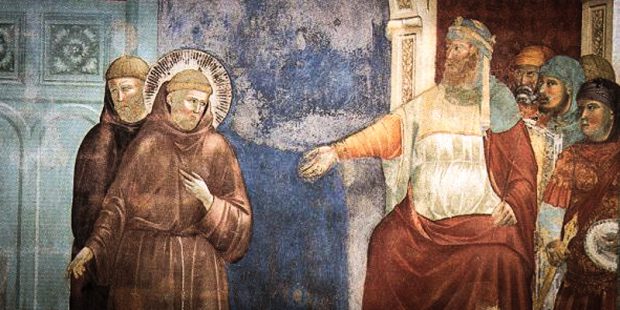The September 2019 issue of Ecumenical Trends, a publication of the Graymoor Ecumenical and Interreligious Institute focusing on ecumenical and interfaith consultations, conversations, dialogues and cooperation around the world, is the first half of a two-month commemoration of the 800th anniversary of St. Francis’ visit to Sultan Malik al-Kamil in Egypt, during the Fifth Crusade. This encounter between sultan and saint, in 1219, has been interpreted in numerous ways but is often celebrated as an instance of interreligious hospitality that stands out against a context of intense animosity and brutal warfare.
The Taste of the Absolute: Encountering Others, Envisioning Peace
Imam Feisal Abdul Rauf and Aaron Hollander
[Imam Feisal Abdul Rauf is an American Sufi imam, author, and activist who founded and serves as the President of Cordoba House, a nonprofit institute that, by connecting people to God, seeks to build trust and improve understanding among people of all religions. Part of the Cordoba House mission is shaping the agenda for the next generation of American Muslim leaders to address the unique needs of their communities. He is the author of six books, including the highly acclaimed Moving the Mountain: A New Vision of Islam in America, as well as numerous articles and op-eds.]
Aaron Hollander, for Ecumenical Trends: Thank you, Imam, for joining me for this conversation—the first fruits of Ecumenical Trends’ special attention, this Autumn, to Muslim-Christian encounter and dialogue. It’s lovely to meet you and to begin what we hope will be more of a relationship between our two neighboring organizations, a mere seventeen floors apart!
To get started, I think it’s important that our readers understand who you are—about the interfaith vision that has animated you for these past decades, and about the convictions that led you to create Cordoba House in the first place. I wonder if you’d share with us a little of your own background, how you got to be where you are.
Imam Feisal Abdul Rauf: Well, to begin biographically: I was born in Kuwait of Egyptian parents. My earliest memories are from when my father went to study in England. I lived in England for five years, until I was six years old.. Then my father was transferred to Malaysia, where we lived among not only Muslim Malays but also the other major demographic segments of the population—the Indians, who are predominantly Tamil in ethnicity and Hindu in religion, except for a small minority from North India, who are Muslims, and the Chinese, who are predominantly Buddhist, though some are Christians. By the time I came to the United States at the age of seventeen, I had been exposed from my earliest days to several substantively different cultures—this face-to-face exposure, in fact, was part of my own culture, part of who I was.
And as I came of age and began to practice my faith, I could also see that the varieties of practice among the Muslims of Egypt, Malaysia, Pakistan, Turkey, and so forth, flowed not from creedal disagreements but from the cultural traditions of those societies, a reality shared by other religious traditions—Islamic music from India has much in common with Hindu music, while Muslim songs from Turkey sound virtually identical to songs sung by the Christian monks in Greece. What does this mean, I wondered? Isn’t it significant that these traditions—Muslim and otherwise—are so internally flexible and yet have so much in common with one another in how they are expressed? So I began to search for what was at the core of the religions and what was at the core of myself, who I was as a person, as a being. After all, my body changed, my ideas changed, my emotions changed, the people whom I loved changed, my ambitions changed—so I said to myself, if everything about me changes, why do I still regard myself as the same person?
The only way I could answer that was to narrow my identity to what I call the “timeless I.” If you don’t believe in God then you believe that everything you are ends at death, but as believers in human immortality we believe that this immortal, timeless self, this essential self, will continue living even after our bodies have died. And this timeless self is deeper than everything, even deeper than the religious forms and traditions in which our spirituality has been shaped. That is who I was—everything else has an expiration date.
So I came to the conclusion, after many years of readings in the world’s religions and many years of experience living among people of different faiths, that all religions are connecting us in one way or another to the Absolute, which we call by different names. The Qur’an teaches us that God sent messengers to every community in the world and gave them their own rituals by which to honor him. Yet the message was essentially the same: that there is one God, that created the universe and created us as his highest form of creation, that we have a particular mandate to be his stewards and to discharge our obligations as such, and that, indeed, all the revelations sent down by God are at their core the same. So therefore, if we look at all the so-called “different” religions from God’s eyes—which is the perspective from which we always have to consider things!—these are all different revelations of God’s one truth. The challenge is how to internalize that understanding, and then how to practice it when we encounter so many differences among people and communities and political institutions.
We invite you to read the full article here!

